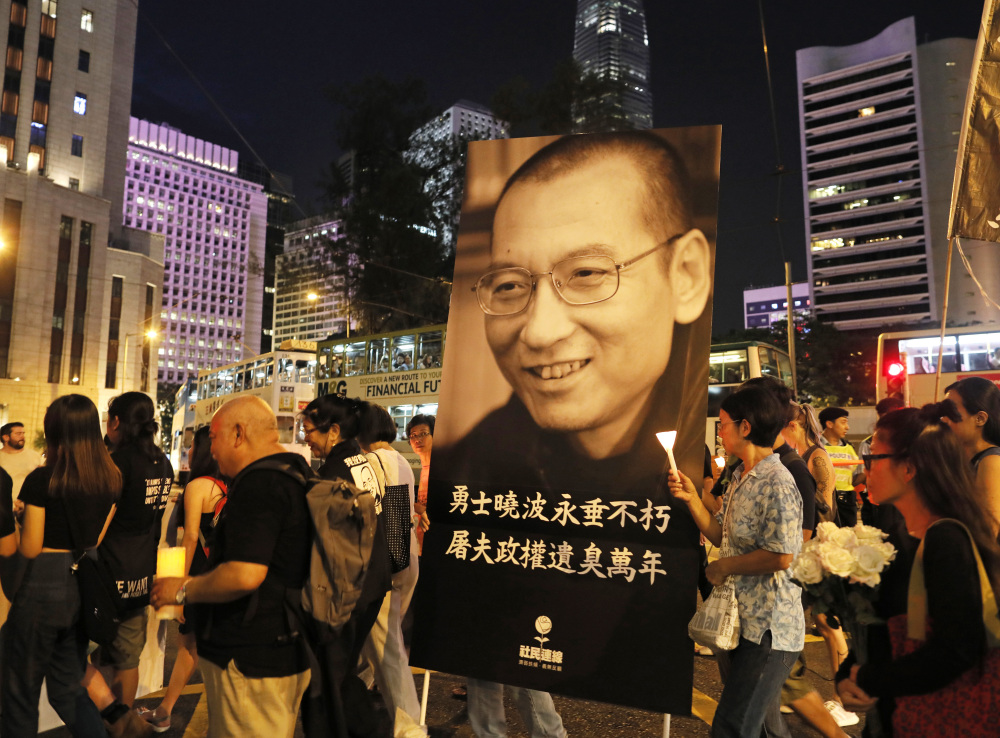SHENYANG, China —Family members of Liu Xiaobo scattered the Nobel Peace Prize laureate’s ashes into the sea on Saturday in funeral proceedings closely orchestrated by the Chinese government following his death from cancer while in custody.
Liu’s supporters said the move was intended by the authoritarian government to permanently erase any traces of China’s best-known political prisoner, who died Thursday at the age of 61.
The sea burial took place Saturday at noon, just hours after his cremation, a spokesman for the northeastern city of Shenyang, where Liu died, told reporters.
Liu’s elder brother, also addressing reporters at the briefing, thanked the ruling Communist Party and the government for its handling of his brother’s funeral. The brother, Liu Xiaoguang, is regarded by Liu’s friends as having long been unsupportive of Liu’s political advocacy.
Liu died from multiple organ failure following a battle with liver cancer while serving an 11-year sentence for incitement to subvert state power. In the run-up to his death, Beijing faced mounting international criticism for not letting him and his wife travel for treatment abroad as he had wished.
The government held two briefings Saturday and provided photos of the funeral and the sea burial, the latest moves in a propaganda campaign seemingly aimed at countering criticism that Beijing has failed to handle Liu’s deterioration and dying wishes in a humanitarian way. A video about Liu’s hospital treatment released on the website of Shenyang’s judicial bureau Friday appeared aimed at the same objective.
Activists and friends of the family said the sea burial appeared to be Beijing’s way of removing every last physical trace of Liu. It also removes the need for a land-based grave at which his supporters would have been able to pay their respects.
“The government’s thinking is that in this way, they can destroy the body and remove all traces of him,” dissident and family friend Hu Jia said by phone.
“After all, he’s a Nobel Peace Prize laureate and he died after being suppressed by the authorities,” Hu said. “The authorities are very worried that a grave would be the focal point of the public’s actions to memorialize him, which could easily turn into protests.”
Liu was only the second Nobel Peace Prize winner to die in police custody, a fact pointed to by human rights groups as an indication of the Chinese Communist Party’s increasingly hard line against its critics. The first, Carl von Ossietzky, died from tuberculosis in Germany in 1938 while serving a sentence for opposing Adolf Hitler’s Nazi regime.
Liu rose to prominence during the 1989 pro-democracy protests centered in Beijing’s Tiananmen Square. He was sentenced to 11 years in prison in 2009.
Send questions/comments to the editors.



Success. Please wait for the page to reload. If the page does not reload within 5 seconds, please refresh the page.
Enter your email and password to access comments.
Hi, to comment on stories you must . This profile is in addition to your subscription and website login.
Already have a commenting profile? .
Invalid username/password.
Please check your email to confirm and complete your registration.
Only subscribers are eligible to post comments. Please subscribe or login first for digital access. Here’s why.
Use the form below to reset your password. When you've submitted your account email, we will send an email with a reset code.